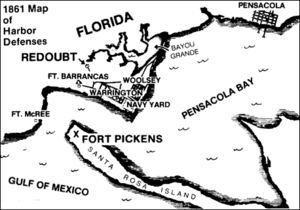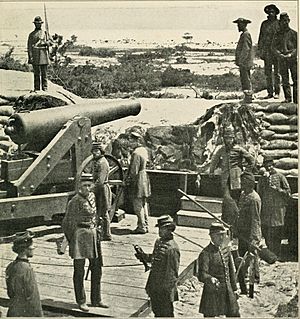Battle of Pensacola (1861) facts for kids
Quick facts for kids Battle of Pensacola |
|||||||
|---|---|---|---|---|---|---|---|
| Part of the American Civil War | |||||||
 Map of the defenses of Pensacola Bay. |
|||||||
|
|||||||
| Belligerents | |||||||
| Commanders and leaders | |||||||
| Harvey Brown | Braxton Bragg | ||||||
| Strength | |||||||
| 2,000 | 7,000 | ||||||
| Casualties and losses | |||||||
| unknown | unknown | ||||||
The Battle of Pensacola was an important fight during the American Civil War. It happened between soldiers from the Confederate States of America and the Union navy. The battle took place around Pensacola Bay in Florida. After many months of fighting, the Confederate forces kept control of the city and its forts.
Contents
Why the Battle Happened
After Abraham Lincoln was elected President, some southern states decided to leave the United States. This was called secession. South Carolina was the first state to leave in December 1860.
On January 8, 1861, a small group of soldiers at Fort Barrancas stopped some local men from taking over the fort. Some people believe these were the very first shots fired by U.S. forces in the Civil War.
The next day, Florida left the Union. The soldiers at Fort Barrancas moved to Fort Pickens. Fort Pickens was older but easier to defend.
The Siege of Pensacola
For several months, both sides got ready for a big fight. They built new places for cannons and brought in more soldiers. The Union and Confederate forces often fired cannons at each other. But these attacks usually did not cause much damage.
By the end of 1861, the Confederate side had about 7,000 men. The Union had about 2,000 soldiers around Fort Pickens.
Battle of Santa Rosa Island
On October 9, 1861, Confederate General Braxton Bragg ordered an attack. His soldiers tried to take Fort Pickens. But the attack was not successful.
Union commander Colonel Harvey Brown decided to strike back. He planned his own attack. His main target was Fort McRee. This fort was closest to Fort Pickens. It also blocked any path to Pensacola.
Battle of Fort McRee
The Union attack began on the morning of November 22, 1861. Union forces at Fort Pickens fired many cannons at Fort McRee. Two Union ships, the Niagara and the Richmond, also joined the attack.
At first, the Confederates fired back strongly. They even badly damaged the Richmond. But the two Union ships kept firing. By afternoon, the cannons next to Fort McRee stopped firing. The guns of Fort McRee became silent by 5 PM. The ships had to leave because the water level dropped and it got dark.
After the day's fighting, General Bragg checked on his defenses. The commander of Fort McRee, Colonel John B. Villepique, said his fort was very exposed. He also said half of his weapons were broken. Their gunpowder was not protected. Villepique asked to destroy the fort and leave. But Bragg said no. He worried about how leaving would affect his soldiers and the enemy.
At 10 AM on November 23, the Niagara started attacking Fort McRee again. Cannons from Fort Pickens also fired. But the guns at Fort McRee stayed silent. This day marked the end of Colonel Brown's attack.
Fort McRee was still standing, but it was badly damaged. Large parts of its walls were blown away. Other parts had holes shot right through them. One section of the wall completely fell down. Most of the wood inside the fort burned. One place where gunpowder was stored collapsed. Six Confederate soldiers died there.
The fighting on November 22 and 23 was the last time Fort McRee was involved in a battle. There was another cannon fight on January 1, 1862, but Fort McRee did not take part.
Evacuation
In May 1862, the Confederate forces learned that the Union Army had taken New Orleans. So, they left Pensacola. They burned Fort McRee and other important buildings in the area. There are no records that show the Union forces ever repaired Fort McRee.
 | George Robert Carruthers |
 | Patricia Bath |
 | Jan Ernst Matzeliger |
 | Alexander Miles |


